LAB ALUMNI
MSc Students
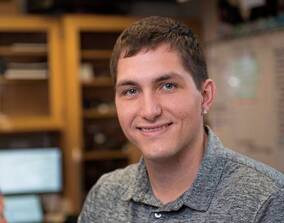
Daniel Dudek, Jr. (MSc, Biology - 2020)
Thesis: Unraveling the taxonomic confusion of Pacific Coast leopard frogs (Ranidae: Rana: subgenus Pantherana).
Daniel graduate from Pennsylvania State University in the fall of 2016 with a B.S. in Biology, focused on plant physiology. During his time at Penn State, Dan worked in the DePamphilis lab assisting a PhD student with phylogenetic analyses of mistletoe species found throughout the Caribbean, collected samples for the "arboretum barcoding project." In the summer of 2016, he traveled to Fudan University in Shanghai, China, where he studied reproductive biology. His research interests include studying evolutionary relationships, gene regulation, and ecology. For his thesis research, Dan is focused on resolving the taxonomic status of Pacific lowland leopard frogs (Ranidae: subgenus Pantherana) from Central America. With the spare time he used to have, he enjoyed traveling, lifting, reading and watching movies.
Thesis: Unraveling the taxonomic confusion of Pacific Coast leopard frogs (Ranidae: Rana: subgenus Pantherana).
Daniel graduate from Pennsylvania State University in the fall of 2016 with a B.S. in Biology, focused on plant physiology. During his time at Penn State, Dan worked in the DePamphilis lab assisting a PhD student with phylogenetic analyses of mistletoe species found throughout the Caribbean, collected samples for the "arboretum barcoding project." In the summer of 2016, he traveled to Fudan University in Shanghai, China, where he studied reproductive biology. His research interests include studying evolutionary relationships, gene regulation, and ecology. For his thesis research, Dan is focused on resolving the taxonomic status of Pacific lowland leopard frogs (Ranidae: subgenus Pantherana) from Central America. With the spare time he used to have, he enjoyed traveling, lifting, reading and watching movies.
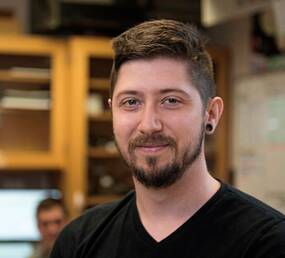
Justin O'Neill (MSc, Biology - 2020)
Thesis: Ecological niche modeling in a phylogenetic context: Exploring distributions and contact zones between two Central American leopard frogs (Amphibia: Ranidae).
Justin graduated from Robert Morris University in 2015 with a B.S. in Biology. His research interests include herpetofaunal systematics and ecology. For his thesis research, Justin is using species distribution models and nuclear DNA loci to evaluate the taxonomic status of a divergent population of Mesoamerican true frogs (Ranidae: subgenus Lithobates). In his spare time he enjoys mountain biking, hiking, and reading.
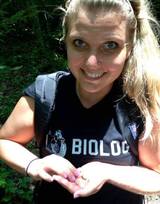
Catherine Krygeris (MSc 2019)
(advised with Dr. Joseph Duchamp)
Catie graduated Summa Cum Laude with her BSc in Biology Education from IUP in 2014, where she completed her Biology Honors research (Morphological systematics of Ptychohyla from the Cordillera Nombre de Dios, Honduras) in the Townsend Lab. She is the first student accepted into the Biology Accelerated MSc Program, and continued work started in our lab under the direction of Dr. Joseph Duchamp. In 2012, Catie interned at the Argonne National Laboratory in the Environmental Sciences Division, where she helped identify contaminated lands for reuse as solar power facilities. In Summer 2013, she interned at the Oak Ridge National Lab collecting data from different tree species to use in climate modeling. Catie was Miss IUP (2013-14), President of the Sigma Kappa sorority (2013-14), and was very active in community service during her undergraduate tenure at IUP.
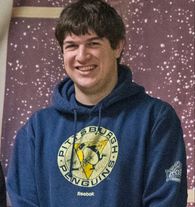
Michael Almasy (MSc, Biology - 2018)
Non-thesis research paper: Building a DNA barcode library for identifying freshwater macroinvertebrates in Pennsylvania, with an annotated bibliography.
Mike is a graduate of Saint Vincent College in 2016 with a B.S. in Biology and a minor in Spanish. His undergraduate research focused on the impact of varying diets and cage sizes on captive tufted titmice (Baeolophus bicolor). His research interests center on the study of evolution with respect to morphological characteristics of animals, systematics, and taxonomy. He also is a big fan of paleobiology, particularly with consideration to extant species of animals and he hopes to continue to expand his fossil collection at home. His thesis research is focused on the morphological systematics of highland alligator lizards (Anguidae: Mesaspis) from Honduras and Nicaragua.
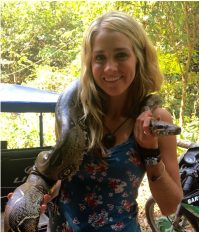
Kathryn Coates (MSc, Biology - 2018)
Thesis: Assessing genetic diversity, hybridization, and microhabitat associations of Valley & Ridge Salamander (Plethodon hofmanni) populations from the Allegheny Plateau of western Pennsylvania
Kathryn graduated from IUP Biology MS program in May 2018, where she completed her thesis work investigating the ecology and genetic relationships of sympatric populations of Plethodon hoffmani and P. cinereus in the northern Appalachians. Kat previously graduated from Old Dominion University in 2015 with a BS degree in Biology and a minor in Environmental Issue and Management. In 2011, she assisted a PhD student with her research in South Africa collecting behavioral data on partial-captive African savanna elephants (Loxodonta africana), and in 2014, she spent a semester in East Africa studying African wildlife conservation and conducting undergraduate research with the School for Field Studies.
Thesis: Assessing genetic diversity, hybridization, and microhabitat associations of Valley & Ridge Salamander (Plethodon hofmanni) populations from the Allegheny Plateau of western Pennsylvania
Kathryn graduated from IUP Biology MS program in May 2018, where she completed her thesis work investigating the ecology and genetic relationships of sympatric populations of Plethodon hoffmani and P. cinereus in the northern Appalachians. Kat previously graduated from Old Dominion University in 2015 with a BS degree in Biology and a minor in Environmental Issue and Management. In 2011, she assisted a PhD student with her research in South Africa collecting behavioral data on partial-captive African savanna elephants (Loxodonta africana), and in 2014, she spent a semester in East Africa studying African wildlife conservation and conducting undergraduate research with the School for Field Studies.
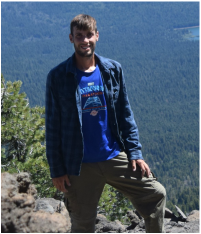
Chris Garbark (MSc, Biology - 2018)
Thesis: The relationship of the red-backed salamander abundance to the direct and indirect use value of undisturbed forest, a timberland mosaic of forest, and agriculture land-uses.
Currently: Program Director, Conemaugh Valley Conservancy
Chris graduated from Duquesne University in 2014 with a B.S. in Biology. He worked as a Biological Science Technician for the USGS in 2016 on an on-going research project on Thamnophis gigas, duties included capturing snakes for abundance and occupancy monitoring & utilizing radio-telemetry to track their location. In the summer of 2015, he worked as an AmeriCorps member with the Western Pennsylvania Conservancy on several projects including Hellbender surveys, inventories of un-assessed waters, brook trout habitat assessment, and stream restoration construction. As an undergraduate assisted in research on the effects of chronic stress and the susceptibility to the chytrid fungus in Plethodon shermani. Research interests are focused around the biodiversity and conservation of herpetofauna. In his spare time I enjoy hiking, running, fishing, and being with his dog.
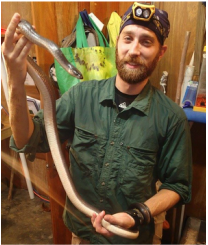
Erich Hofmann (MSc, Biology - 2017)
Thesis: Cryptic diversity and phenotypic stasis in a complex of highland anoles (Squamata: Dactyloidae: Norops crassulus species subgroup)
Currently: PhD student - Clemson University (Chris Parkinson Lab)
Erich graduated from the IUP Biology MS program in May 2017, after receiving the IUP 2017 Outstanding Graduate Research Award for his thesis elucidating the evolutionary history and taxonomy of a challenging group of cryptic tropical lizards, the Norops crassulus complex. This project including estimating phylogenetic relationships, divergence dates, and biogeographic history of populations across Nuclear Central America using three mitochondrial and three nuclear gene loci, and providing a comprehensive evaluation of morphological variation leading to delimitation of a new species from Honduras. Erich's previously graduated from the University of North Carolina Wilmington in 2013 with a BSc in Conservation Biology and a minor in Environmental Studies. His field experience has included trips to the Nicaraguan highlands to undertake preliminary reptile and amphibian inventories, and multiple months in Belize, where he coordinated herpetofaunal research in the Maya Mountains.
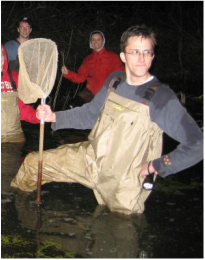
Thomas J. (TJ) Firneno (MSc, Biology - 2016)
Thesis: An integrative assessment of species boundaries in Mesoamerican toads (Bufonidae: Incilius coccifer complex)
Currently: PhD student - University of Texas, Arlington (Matt Fujita Lab)
TJ graduated from the IUP Biology MS program in May 2016, having been awarded the university-wide 2016 Outstanding Graduate Research Award for his thesis investigating the species boundaries in four closely-related Mesoamerican toads using mitochondrial DNA, electrophoretic profiling of bufotoxin proteins, and species distribution modeling. TJ graduate from Duquesne University in 2011 with his BSc in Biological Science, along with a triple minor in Biochemistry, Mathematics, and Theater Arts, and worked as the Lab Technician for the Duquesne Biology Department from 2011-2013. While at Duquesne, TJ carried out his undergraduate thesis work on hybridization and phylogeography of the American toad (Anaxyrus americanus) and Fowler's toad (A. fowleri) in Eastern North America in Brady Porter's lab, and also studied bacterial genetics of streptococcus in feral cats in Nancy Trun's lab. Outside of the sciences TJ is an actor, set designer and director for theaters around Pittsburgh, and serves as a guest artist and faculty member for Ballet Northeast and the Wilkes University Conservatory.
Thesis: An integrative assessment of species boundaries in Mesoamerican toads (Bufonidae: Incilius coccifer complex)
Currently: PhD student - University of Texas, Arlington (Matt Fujita Lab)
TJ graduated from the IUP Biology MS program in May 2016, having been awarded the university-wide 2016 Outstanding Graduate Research Award for his thesis investigating the species boundaries in four closely-related Mesoamerican toads using mitochondrial DNA, electrophoretic profiling of bufotoxin proteins, and species distribution modeling. TJ graduate from Duquesne University in 2011 with his BSc in Biological Science, along with a triple minor in Biochemistry, Mathematics, and Theater Arts, and worked as the Lab Technician for the Duquesne Biology Department from 2011-2013. While at Duquesne, TJ carried out his undergraduate thesis work on hybridization and phylogeography of the American toad (Anaxyrus americanus) and Fowler's toad (A. fowleri) in Eastern North America in Brady Porter's lab, and also studied bacterial genetics of streptococcus in feral cats in Nancy Trun's lab. Outside of the sciences TJ is an actor, set designer and director for theaters around Pittsburgh, and serves as a guest artist and faculty member for Ballet Northeast and the Wilkes University Conservatory.
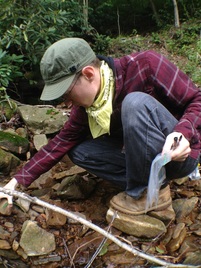
Alex Hess (MSc, Biology - 2016)
Thesis: Community ecology and evolution of lungless salamander assemblages in temperate and tropical systems
Currently: PhD student - University of Tulsa (Ron Bonett Lab)
Alex graduated from the IUP Biology MS program in August 2016, where he completed thesis work on the ecology and evolution of temperate (Desmognathus) and tropical (Bolitoglossa) salamander assemblages. His thesis uncovered new sympatric populations of Bolitoglossa nympha and B. rufescens in northwestern Honduras, and examined at interspecific interactions among Desmognathus in northern Appalachian streams containing both two and three species assemblages. He received his BSc in Microbiology from the University of in 2011, where he conducted undergraduate research focused on compost ecology. He has worked as a volunteer with the Western Pennsylvania Conservancy, and enjoys fishing, skiing, stomping around in the woods, managing his garden, and maintaining his snake colony. His graduate research will examine the comparative community ecology of multi-species dusky salamander (Desmognathus) assemblages in the northern Appalachian Mountains and Allegheny Plateau. Alex will compare microhabitat and resource partitioning in assemblages with two species (D. fuscus and D. ochrophaeus) and three species (D. fuscus, D. monticola, and D. ochrophaeus) to evaluate the impact of the presence of large predatory species within an assemblage.
Thesis: Community ecology and evolution of lungless salamander assemblages in temperate and tropical systems
Currently: PhD student - University of Tulsa (Ron Bonett Lab)
Alex graduated from the IUP Biology MS program in August 2016, where he completed thesis work on the ecology and evolution of temperate (Desmognathus) and tropical (Bolitoglossa) salamander assemblages. His thesis uncovered new sympatric populations of Bolitoglossa nympha and B. rufescens in northwestern Honduras, and examined at interspecific interactions among Desmognathus in northern Appalachian streams containing both two and three species assemblages. He received his BSc in Microbiology from the University of in 2011, where he conducted undergraduate research focused on compost ecology. He has worked as a volunteer with the Western Pennsylvania Conservancy, and enjoys fishing, skiing, stomping around in the woods, managing his garden, and maintaining his snake colony. His graduate research will examine the comparative community ecology of multi-species dusky salamander (Desmognathus) assemblages in the northern Appalachian Mountains and Allegheny Plateau. Alex will compare microhabitat and resource partitioning in assemblages with two species (D. fuscus and D. ochrophaeus) and three species (D. fuscus, D. monticola, and D. ochrophaeus) to evaluate the impact of the presence of large predatory species within an assemblage.
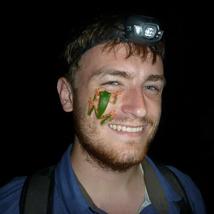
Michael Itgen (MSc, Biology - 2016)
Thesis title: Taxonomic revisions of two species of Magnadigita (Plethodontidae: Bolitoglossa) from Honduras
Currently: PhD student - Colorado State University (Rachel Mueller Lab)
Mike graduated from the IUP Biology MS program in August 2016, where his thesis work focused on the morphological and molecular systematics of Bolitoglossa celaque and B. porrasorum in Honduras. His thesis work combined phylogenetic analysis, external morphology, and osteology to characterize differentiation among allopatric populations of cloud forest salamanders, revealing support for three undescribed species. Mike received his B.A. in Biology from Hartwick College in 2013, where he researched functional morphology in plethodontid salamanders, primarily on species within Bolitoglossa, under Dr. Stanley Sessions. As an undergraduate, he volunteered as a surveyor of herpetofauna in Central and South America, conducted cytogenetic research on Bolitoglossa chica from Ecuador and worked in Hartwick College's Amphibian Research Lab as a histologist. His research interests also include genomics, systematics, and evolutionary development.
Thesis title: Taxonomic revisions of two species of Magnadigita (Plethodontidae: Bolitoglossa) from Honduras
Currently: PhD student - Colorado State University (Rachel Mueller Lab)
Mike graduated from the IUP Biology MS program in August 2016, where his thesis work focused on the morphological and molecular systematics of Bolitoglossa celaque and B. porrasorum in Honduras. His thesis work combined phylogenetic analysis, external morphology, and osteology to characterize differentiation among allopatric populations of cloud forest salamanders, revealing support for three undescribed species. Mike received his B.A. in Biology from Hartwick College in 2013, where he researched functional morphology in plethodontid salamanders, primarily on species within Bolitoglossa, under Dr. Stanley Sessions. As an undergraduate, he volunteered as a surveyor of herpetofauna in Central and South America, conducted cytogenetic research on Bolitoglossa chica from Ecuador and worked in Hartwick College's Amphibian Research Lab as a histologist. His research interests also include genomics, systematics, and evolutionary development.
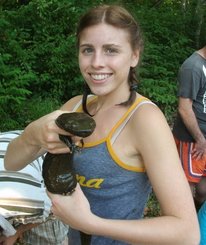
Rebecca Ferry (MSc, Biology - 2014)
Non-thesis research paper: Review of the effects of anthropogenic acidification on amphibians and amphibian communities
Currently: AmeriCorps biologist, Canaan Valley National Wildlife Refuge, West Virginia
Rebecca completed her MSc in Biology in 2014, researching the effects of acid mine drainage and its constituent components on amphibian species and communities. While at IUP, Rebecca also conducted habitat and vegetation surveys and trapped for the Allegheny woodrat (Neotoma magister) in south-central Pennsylvania during the summer of 2012. She received her BSc in Biology from Edinboro University of Pennsylvania (EUP) in December 2010, where she participated in field research on the occurrence of the causative agent of Lyme disease (Borrelia burgdorferi) in white-footed mice (Peromyscus leucopus) at Presque Isle State Park in spring 2007, lab research on the presence of phospholipase A2, a dermonecrotic enzyme, in spider venoms in spring 2010, and a study on speciation in the black and yellow garden spider (Argiope arantia) using the internal transcribed spacer 2 (ITS2) gene.
Non-thesis research paper: Review of the effects of anthropogenic acidification on amphibians and amphibian communities
Currently: AmeriCorps biologist, Canaan Valley National Wildlife Refuge, West Virginia
Rebecca completed her MSc in Biology in 2014, researching the effects of acid mine drainage and its constituent components on amphibian species and communities. While at IUP, Rebecca also conducted habitat and vegetation surveys and trapped for the Allegheny woodrat (Neotoma magister) in south-central Pennsylvania during the summer of 2012. She received her BSc in Biology from Edinboro University of Pennsylvania (EUP) in December 2010, where she participated in field research on the occurrence of the causative agent of Lyme disease (Borrelia burgdorferi) in white-footed mice (Peromyscus leucopus) at Presque Isle State Park in spring 2007, lab research on the presence of phospholipase A2, a dermonecrotic enzyme, in spider venoms in spring 2010, and a study on speciation in the black and yellow garden spider (Argiope arantia) using the internal transcribed spacer 2 (ITS2) gene.
Undergraduate Researchers
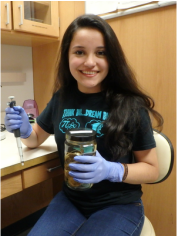
Esbeiry Cordova-Ortiz (BSc, Biology [ECEB] - 2019)
Esbeiry was born in Mexico and emigrated to the United States at the age of eight. She started her education at IUP in the fall of 2015 as a biology for pre-med major, but quickly saw the light and changed her concentration to Ecology & Conservation after she started volunteering in our lab. She plans to continue her education at the graduate level, and is currently working on projects involving the systematics of highland alligator lizards (Mesaspis) and true frogs (Ranidae) in Mexico and Central America. In her free time, she enjoys reading and writing.
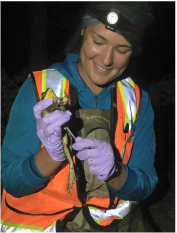
Ayla Ross (BSc, Biology [ECEB] - 2019)
2017-19 Biology Honors Program
Ayla started at IUP in the Fall of 2015 as a Biology major and immediately began working in our lab, where she is learning the ropes and has begun to work generating sequence data for a series of projects involving Mesoamerican stream frogs (genus Ptychohyla). She is a member of the IUP SEEDS Chapter. During her free time, she loves taking hikes, kayaking, and catching frogs at nearby ponds. Outside the realm of biology, Ayla is pursing her BCIA certification in Neurofeedback and is the treasurer of the IUP Swim Club.
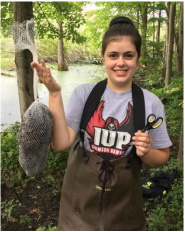
Samantha Soto (BSc, Biology [ECEB] - 2018)
2017-18 Ronald E. NcNair Scholar
Sam is an Ecology, Conservation, and Environmental Biology major who started at IUP in Fall 2014. She has interned at the Carnegie Science Center in Pittsburgh, working with the reptiles, and is interested in all things herpetological. Sam loves to travel, and has been to Costa Rica and a number of states around the country. She plans to pursue a career studying amphibians and reptiles, and will work on exploring different research opportunities in the lab during her freshman in order to develop a research training plan for her undergraduate education.
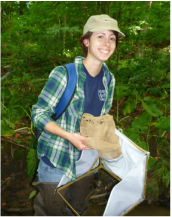
Kayla Weinfurther (BSc, Biology [ECEB] - 2016)
Currently: MSc student - East Carolina University (Kyle Summers Lab)
Kayla graduate in May 2016 with her BSc in Ecology, Conservation, and Environmental Biology, after being awarded the 2016 IUP Biology Outstanding Student Award. She began working in the Townsend Lab the first week of her freshman year, and successfully completed a Biology Honors Research Project focused on the integrative systematics of Mesoamerican true frogs (Ranidae). During her tenure in the lab, Kayla presented her research at the 2015 Congress of the Society for Mesoamerican Biology and Conservation in Honduras, the 2016 Florida Herpetology Conference, the 2016 Commonwealth of Pennsylvania University Biologists Meeting, as well as numerous on campus presentations. She also received research and travel grants from the School of Graduate Studies and Research and Biology Department. Kayla is currently a graduate student in the Biology MSc program and East Carolina University, where she is studying the evolution of poison arrow frogs (Dendrobatidae) in the lab of Dr. Kyle Summers.

Mariah Kenney (BSc, Biology - 2015)
Currently: MSc student - University of Michigan (Lacey Knowles Lab)
Mariah graduated in May 2015 with her BSc in Biology from the Indiana University of Pennsylvania in 2015, where she researched the historical biogeography of Mesoamerican highland pitvipers, further evaluating the complex history of Bothriechis guifarroi and B. lateralis via a fossil-calibrated and coalescent-based approach. She also studied the non-adaptive radiation of Mesoamerican highland salamanders using Likelihood, Bayesian and statistical approaches. Mariah wishes to pursue a career where she can integrate phylogenetic methods and historical biogeography in order to answer complex questions of diversification and biotic interactions, and currently a graduate student in the laboratory of Dr. Lacey Knowles at the University of Michigan.
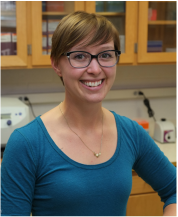
Gretchen McCormick (BSc, Biology [ECEB] - 2015)
Currently: Membership Coordinator, Denver Botanic Gardens
Gretchen graduated in May 2015 with her BSc in Ecology, Conservation, and Environmental Biology, after winning the 2014-15 IUP Women’s Senior Leadership Award and the IUP Biology Outstanding Student Award. Gretchen transferred to IUP in the Spring of 2013 as an Ecology, Conservation, and Environmental Biology major. In Summer 2013 she attended Dr. Townsend's 3-week field techniques course at Pymatuning Laboratory of Ecology. As an undergraduate researcher in the Townsend Lab, Gretchen worked on an independent research project examining the phylogeography of a widespread species of Mesoamerican leaf-litter toad, Rhaebo haematiticus, which she presented at the 2014 SMBC Congress in Copan, Honduras. She served as the President of the IUP chapter of the ESA SEEDS Club, and organized the First IUP Community Seed Swap in November 2014. After graduation, Gretchen moved to Boulder, Colorado, to work at the Cure Organic Farm, a 12+ acre organic vegetable farm. There she gained experience in bee-keeping, animal husbandry, crop-rotation, tractor work, irrigation, and more. Gretchen’s main career goal is to work in the non-profit sector to teach others how to become more self-sustainable through gardening, preserving/canning, seed-saving, and cooking.
Currently: Membership Coordinator, Denver Botanic Gardens
Gretchen graduated in May 2015 with her BSc in Ecology, Conservation, and Environmental Biology, after winning the 2014-15 IUP Women’s Senior Leadership Award and the IUP Biology Outstanding Student Award. Gretchen transferred to IUP in the Spring of 2013 as an Ecology, Conservation, and Environmental Biology major. In Summer 2013 she attended Dr. Townsend's 3-week field techniques course at Pymatuning Laboratory of Ecology. As an undergraduate researcher in the Townsend Lab, Gretchen worked on an independent research project examining the phylogeography of a widespread species of Mesoamerican leaf-litter toad, Rhaebo haematiticus, which she presented at the 2014 SMBC Congress in Copan, Honduras. She served as the President of the IUP chapter of the ESA SEEDS Club, and organized the First IUP Community Seed Swap in November 2014. After graduation, Gretchen moved to Boulder, Colorado, to work at the Cure Organic Farm, a 12+ acre organic vegetable farm. There she gained experience in bee-keeping, animal husbandry, crop-rotation, tractor work, irrigation, and more. Gretchen’s main career goal is to work in the non-profit sector to teach others how to become more self-sustainable through gardening, preserving/canning, seed-saving, and cooking.
